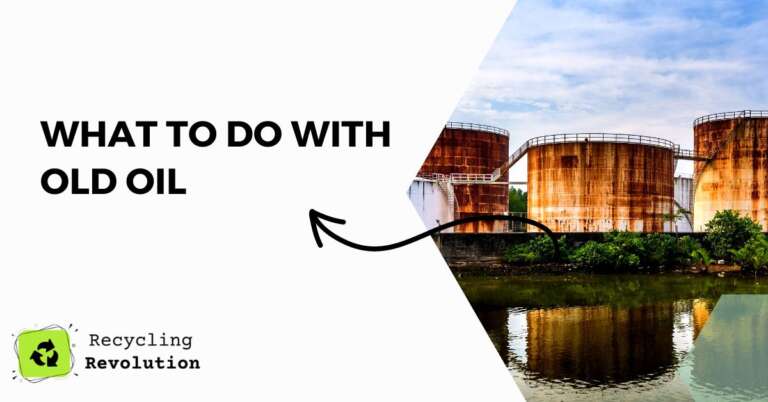In the modern age, as we indulge in our delectable fried dishes or religiously adhere to our vehicle maintenance schedules, we invariably end up with a byproduct – old oil.
The question then looms large: What to do with old oil? Just tossing it out willy-nilly could have severe environmental consequences, while storing it without purpose seems wasteful. If you’ve ever found yourself pondering this, fret not; I’m here to guide you through the best practices.
tl;dr: The most responsible and effective ways to handle old oil include recycling, repurposing for further uses, or disposing of it at a designated facility. Always avoid pouring it down the drain or into the soil.
Understanding The Types of Old Oil
Before diving into disposal methods, it’s essential to categorize the old oil you’re dealing with, as the disposal method may differ.
- Cooking Oil: This is the oil you use in your kitchen. Its properties change after being used to fry or cook food, making it unsuitable for immediate reuse without treatment.
- Motor Oil: Derived from the regular maintenance of vehicles. This oil can contain harmful contaminants but can be re-refined and reused.
The Art of Recycling Old Oil
Recycling stands out as one of the best solutions for dealing with old oil.
- Cooking Oil Recycling: Many localities now offer recycling programs. By recycling, this oil can be processed and converted into biodiesel, a cleaner-burning, renewable alternative to diesel fuel.
Note: Before recycling, filter out any food particles from the oil. This makes the recycling process smoother.
- Motor Oil Recycling: When you get an oil change, most service centers will recycle the old oil for you. It’s a process that removes impurities, allowing the oil to be reused.
I recommend always checking with your service provider to ensure they follow environmentally friendly disposal practices.
Repurposing Old Oil
If you’re a DIY enthusiast, you might love these ideas!
- Cooking Oil for Lamps: Used cooking oil can fuel lamps. It might not light up your whole room, but it can set a cozy ambiance.
- Motor Oil for Lubrication: Old motor oil, when filtered, can serve as a lubricant for tools, hinges, or chains.
Safe Disposal of Old Oil
Sometimes, neither recycling nor repurposing fits the bill. In these cases, safe disposal is the key.
- Cooking Oil: Pour the old cooking oil into a sealable container and dispose of it with your regular trash. Remember, pouring it down the drain can clog pipes and harm aquatic life.
- Motor Oil: Local waste disposal sites or auto stores often accept used motor oil. They have the resources to ensure its proper disposal.
I recommend always reaching out to local authorities or waste disposal sites to inquire about their specific guidelines.
The Environmental Importance
Studies indicate that improperly disposed oil can contaminate water sources, harm aquatic life, and pose risks to human health. A single gallon of motor oil can contaminate up to a million gallons of freshwater.
This underscores the importance of acting responsibly.
Environmental Consequences of Improper Disposal
Understanding the ramifications of inappropriately discarding old oil can motivate us to seek sustainable methods.
- Soil Contamination: When oil seeps into the soil, it diminishes its quality, making the land unproductive for cultivation. Additionally, this pollution can take years to clean, costing immense resources.
- Air Pollution: Did you know that burning used oil releases toxic fumes? These emissions can lead to respiratory issues and intensify global warming.
Potential Reuses for Cooking Oil
Beyond using old cooking oil for lamps, there are other intriguing possibilities:
- Soap Making: Combining used cooking oil with lye can create homemade soap. It’s a crafty and eco-friendly use of something you might have discarded.
- Composting: While it may sound surprising, used cooking oil can be a component in compost. It’s a carbon source that, in moderate amounts, can benefit the composting process.I recommend only adding small quantities to avoid attracting pests.
Motor Oil Beyond Lubrication
The potential of used motor oil isn’t just restricted to lubrication:
- Oil-Based Heaters: Some heaters are designed to run on used motor oil. It’s an ingenious way of reutilizing what might have been waste, turning it into a source of warmth.
- Rust Prevention: A thin layer of old motor oil can protect tools and metal surfaces from rusting. It acts as a barrier, keeping moisture at bay.
The Science of Oil Breakdown
Over time, oil undergoes chemical changes that affect its properties:
- Cooking Oil: When heated repeatedly, cooking oil starts producing harmful compounds. For instance, a study found that aldehyde emissions from reheated oils could have adverse health effects.
- Motor Oil: It collects impurities and breaks down due to the intense conditions within an engine. However, modern refining processes can restore its properties, as suggested by a study that highlighted the viability of re-refining used lubricating oil.
Innovative Solutions on the Horizon
The concern over what to do with old oil isn’t just limited to households or mechanics. Scientists and industries are constantly looking for innovative solutions:
- Biofuel Breakthroughs: Research is ongoing to increase the efficiency of converting used cooking oil to biodiesel. Advancements in this domain can revolutionize how we perceive waste oil.
- Technological Advancements in Oil Treatment: As technology evolves, we’re witnessing machines and devices that can cleanse old oil at home or in small-scale setups, making it reusable without extensive industrial processes.Note: Always keep an eye on tech innovations in this domain. What might seem challenging today could become a breeze tomorrow!
Community Initiatives and Their Role
Community-driven efforts can play a pivotal role in addressing the old oil conundrum:
- Oil Collection Drives: Local community centers or environmental groups often organize drives where people can drop off their used oils. These are then sent to appropriate facilities for recycling or safe disposal.
- Awareness Campaigns: The more people know about the repercussions of improper oil disposal and the available alternatives, the better the collective response will be.
I recommend joining or supporting such community initiatives. Collective action often has a more significant impact than isolated efforts.
In essence, the journey of understanding what to do with old oil is not just about disposal but also about tapping into its potential. As we progress, it becomes clear that every drop matters – for our environment, our health, and our future.
Whether you’re recycling, repurposing, or safely discarding, remember: informed decisions pave the way for a sustainable tomorrow.
Conclusion
What to do with old oil isn’t just a question of convenience; it’s a call to environmental responsibility. By recycling, repurposing, or safely disposing of old oil, we can reduce our carbon footprint and contribute to a healthier planet.
So the next time you find yourself with that jug of used oil, remember: a little effort goes a long way in protecting our shared home.
FAQ
Can I reuse old cooking oil?
Yes, but ensure it’s filtered to remove food particles. However, repeated heating can degrade the oil’s quality.
Is old oil harmful?
If mishandled, yes. It can contaminate water sources, impact marine life, and pose health risks to humans.
Can I mix old motor oil with new oil?
Technically, yes. But I recommend avoiding this as old oil might contain contaminants that can affect the performance of the new oil.
Note: Always consult with professionals or local guidelines when in doubt about handling or disposing of old oil.

